Arts & Culture
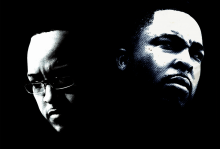
By This We Know
The Chicago-based rap duo Verbal Kwest explore the Bible’s commandments of love in their latest release, Lovkwest. On seven tracks, pastor-rappers J.Kwest (Julian DeShazier) and BreevEazie (Anthony Lowery) unleash words of wisdom and passion over intricate beats, speaking of God’s great embrace in a year of immense loss. Verbal Kwest.
The Longitudes
“The history of Christianity is one of cultural appropriation,” Phuc Luu says in his debut Jesus of the East: Reclaiming the Gospel for the Wounded. Drawing on traditions of the Eastern church, Luu dislodges the West’s dominance over much of Christianity, highlighting how the faith doesn’t belong solely to Europeans. Herald Press.
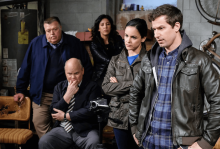
IN THE FIRST season of Brooklyn Nine-Nine, the show’s main protagonist, Jake Peralta (Andy Samberg), arrests a jewel thief named Dustin Whitman (Kid Cudi) without sufficient evidence, and the entire precinct spends the next 48 hours trying to fix his mistake. By showing the police detectives desperately trying to find evidence, Brooklyn Nine-Nine portrays the arrest as a puzzle to be solved instead of an abuse of power.
With likable characters and sharp writing that hits more than it misses, Brooklyn Nine-Nine has cemented itself as both a critic and crowd favorite, earning Emmy nominations and massive support from its networks, NBC and Fox. Its cast is one of the more diverse on television, and so are its characters. The police captain is a gay, Black, married man. Two of the other detectives are Latinx; one of them is a bisexual woman.
But at the end of the day, the show sanitizes police brutality and misconduct with humor. Police incompetence in Brooklyn Nine-Nine is portrayed as funny and showing a need for the character to develop; it doesn’t threaten someone’s safety like it does every day in real life.

WHEN WESTERN THEATER was born in the ancient Theatre of Dionysus some 2,500 years ago, its creators aspired to create a democratic institution, meant to serve the members of every tribe in Greece. The reality fell far short of the aspiration, of course, since women and slaves were excluded from both democracy and the grand stone auditorium. Nevertheless, the theater of Greece was born in a kind of perfect storm, a concurrence of democratic ideology and ideals—especially the belief in free speech for those deemed fit to govern (i.e., free men)—with a golden age of literature. This era brought about some of the most powerful dramatic works known to humanity in the plays of Aeschylus, Sophocles, Euripides, and Aristophanes.
We could be at the brink of another golden age for theater, arising from changes caused by the coronavirus pandemic. How can I say this, when most of those who work in the theater are worried about how theatrical institutions will survive this crisis? Joseph Haj, artistic director of the Guthrie Theater in Minneapolis, notes that theater has endured for centuries “because it is one of society’s proven necessities, not some old-fashioned practice.” It’s a necessity because humans need to gather to hear our stories and find safety in being together—the communal theater experience pushes back at the dangers and sadness that surround us.
And yet the questions abound: Will there be enough funding, public and private, to keep theaters afloat? Will audiences come if they are living in fear? Funding and sufficient audience support were worries before the pandemic hit, even as theatrical writing and technique thrived during the past decade, releasing many new voices onto public stages. The problem is that when a theater ticket often costs upward of $100, few people can afford access to these new voices. Despite the democratic ideals at its roots, U.S. live theater has served a very small, mostly white, upper-middle-class audience. The main exceptions are the rare state and federal grants that provide broader access through educational programs.

Good Trouble is a timely and deeply moving film, particularly in this moment of national awakening and reckoning around police violence and systemic racism, and as we approach what feels like the most consequential election in my lifetime.

“QUIET MIRACLES,” THAT’S what the late writer Brian Doyle calls them, those moments of wonder so freighted with significance they inscribe themselves upon our hearts. If there is a unifying thread in One Long River of Song, a posthumous collection of Doyle’s essays and prose poetry, it is this: Quiet miracles bespot our lives. They are everywhere, if only we have the patience and humility to see them as such.
Consider a shrew or a hummingbird or a can of anchovies clutched to a young boy’s sleeping chest. That’s what Doyle does. He finds miracle and mystery enough to still your heart, bring you to tears, or leave you smirking and smiling in awe. Revealing and reveling in such wonders is what Doyle does best. And he does it time and time again, in short prose poems and essays that rarely run over two pages long.
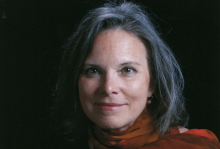
CAROLYN FORCHÉ’S FOURTH poetry collection, Blue Hour, appeared in 2003, and her readers have longed for the next ever since. It’s hard to imagine any poetry book worth a wait of 17 years. Forché’s new collection, In the Lateness of the World, is worth more.
As the title suggests, Forché explores a dying world—countries ravaged and erased by war, islands drowned in natural disasters, seas overflowing with garbage. The poems are both haunting and haunted, including the memories of a lost world and the corpses that remain.
Forché coined the term “poetry of witness.” Her witness here is not only characteristically unflinching but also a challenge to readers.
The first half of the book mostly grieves the world’s tragedies at large, but always with the particularity that gives her ghosts a pulse. Nearly every poem includes rapid lists of sharp images. Forché’s lists dizzy and overwhelm, effectively dropping us into warzones and forcing us to follow her through an apocalypse.
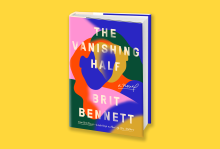
IN HER STUNNING second novel, Brit Bennett, author of The Mothers, once again examines race and kinship. This time, she interrogates the color line through the Vignes twins—their coming of age and its impact on the subsequent generation. Born and raised in the fictional town of Mallard, La., the twins dream of escaping their stifling community. At 16, they run away together. In New Orleans, a desperate choice severs their bond: Stella passes as white to get a job, then leaves her sister Desiree in order to marry a white man.
Years later, when Desiree flees an abusive marriage and returns to Mallard with her daughter, Jude, the town is shocked by the child’s color: “black as tar,” “blueblack.” Having inherited her father’s complexion, Jude looks nothing like her mother. From its opening pages, The Vanishing Half grounds us in this “strange” town that, “like any other, was more idea than place.” The idea: a community for those “who would never be accepted as white but refused to be treated like Negroes.” An idea born of a freed slave, the twins’ ancestor, as he “stood in the sugarcane fields he’d inherited from the father who’d once owned him.”

Force of Nature
The podcast Floodlines tells the stories of four New Orleanians who stayed in the city as Hurricane Katrina hit, 15 years ago this August. Through eight episodes based on a year of reporting, the extensive traumas caused by the storm and a botched federal response are examined. The Atlantic.

WE OFTEN THINK the word “apocalypse” refers to an “end of days” scenario. While that is one usage, it’s incomplete. The Greek root, apokálypsis, is defined as revelation, or an unveiling. It’s often used in prophetic terms, as in the biblical book of Revelation. An apocalypse doesn’t mean destruction so much as laying bare humanity’s underlying truths.
This year, George Miller’s Mad Max: Fury Road, one of the best post-apocalyptic films in a series that helped define the genre, turns 5. Miller’s Mad Max movies are fascinating not just because of their creativity and economical storytelling, but also for how they address the revelatory nature of apocalypse, both in humanity’s sinful nature and its capacity for selflessness.
The Mad Max films happen in a violent wasteland that Miller shows as the direct result of humanity’s greed and recklessness. Fury Road advances that revelation, altering the series’ attitude from cynicism to hope. Fury Road’s message of renewal, and prophetic undertones, makes it a perfect movie for uncertain times.
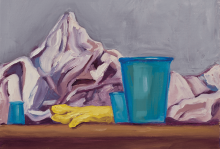
The field, still and breathless,
colored in thirsty hues of yellow,
sits beneath hills just as bleak,
the whole land scoured in disinfectant
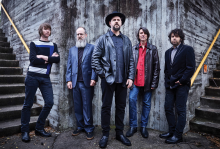
IN 1996, PATTERSON Hood and Mike Cooley co-founded Drive-By Truckers, an alternative-country rock band based in Athens, Ga., that has always celebrated speaking truth to power while making unforgettable music. Over the years, Hood and Cooley have remained the chief songwriters in the band, and one thing has been constant since day one: They speak their minds. That has never been truer than on their latest record, The Unraveling.
“It’s a heavy record, it’s really heavy,” says Hood. “It was painful to write.”
Much of that heaviness revolves around Hood and Cooley plunging themselves into the hypocrisy of the evangelical movement that has come to a vivid crescendo since the 2016 U.S. presidential election.
“I’m not going to put up any pretense that I’m religious, but there’s a lot of Christianity in my background,” Hood admits. “I have very, very close family members who, until fairly recently, considered themselves part of the Christian Right.” He watched as those family members experienced a political turnaround, partly due to how they saw politicians co-opting their faith in ways that went against their interpretation of the teachings of Jesus.
“They’re particularly offended by the whole ‘thoughts and prayers’ thing being bandied about as an excuse to do nothing, as an excuse for inaction,” he says. Because of that, he put pen to paper and wrote the aptly titled “Thoughts and Prayers,” a hauntingly beautiful song that forces listeners to confront the senseless gun violence for which America has become known.
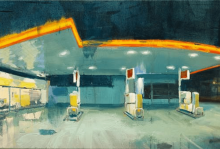
The later it gets, the more nothing.
—Woman at the register
Yeah, we’re open ’til midnight,
but few customers come after 9:00.
I like when it’s slow and quiet—
just me and the store lights.
I don’t like the sirens
racing along Main Street.
I always worry it’s my kid hurt
or my best girlfriend with another
black eye or busted rib.
When I’m here by myself, I draw
dress patterns for my daughter.

TO UNDERSTAND MY evolution as a reconciliation leader, you must first understand that I began my journey sincerely believing that if I could convince evangelical Christians that reconciliation was not some politically motivated agenda but a biblical calling rooted in Scripture, they would pursue racial justice. For years I tried to be biblical enough, nonthreatening enough, patient enough, persuasive enough, theologically rigorous enough, so that no one could say I had a hidden agenda.
That’s what my ministry was about for a very long time. I preached the good news of multiculturalism and diversity at churches and conferences. I led workshops and taught seminars and told people about inclusion and equity and how Jesus demonstrated these principles in his ministry.
But along the way, there were indicators that my approach, while good and well-intentioned, was not effecting the type of change I knew in my heart needed to take place.

IN MARCH , I made my first, and hopefully last, “panic-buy” of the pandemic: three survivalist books that look more like they belong in a nuclear bunker than on my bookshelves amid the theology, poetry, and knitting patterns. My purchases were, however, inspired by my reading Parable of the Sower and Parable of the Talents, classics by the science fiction literary giant Octavia E. Butler (1947-2006).
In these novels, Lauren Olamina—a young, disabled black girl—survives the apocalypse and helps rebuild society with her knowledge of edible wild plants, her sheer will and bravery, and her newfound religion, Earthseed. Lauren’s ability to adapt, to change, is her route through unimaginable suffering and the bedrock of her faith.
Originally published in 1993 and 1998, respectively, Butler’s Parable books were reissued last year, highlighting their current resonance. Sower introduces us to the United States in 2024, a dystopia ravaged by global warming, capitalism, and violence. Slavery, misogyny—the witch-burning kind—homelessness, and addiction are rampant. Lauren’s community is secure as long as the walls that surround it stand; as she rightly senses, walls are wont to crumble. She launches a backup plan that offers a hard hope within relentless loss. Talents continues Lauren’s, and her daughter Asha’s, journeys over the coming decades as the U.S. faces rising terrorist Christian nationalism and the election of an ultraconservative president who wants to “make America great again.”
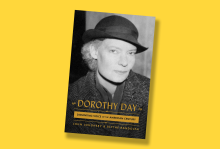
JOHN LOUGHERY AND Blythe Randolph have written a compelling and complete biography of a complex woman who may be the next American saint—and written it with a vibrant, personal voice. They place Catholic Worker co-founder Dorothy Day’s life in historical context, something the small circle of the Catholic Left I inhabit sometimes doesn’t see, which makes this book different than others about her. It inserts her life squarely into the times in which she lived and shows how her fidelity to the gospel as a journalist, activist, and Christian anarchist put her at odds with both church and state. It also shows how she persisted, becoming more and more herself as she aged.
Loughery and Randolph describe Day’s childhood in Brooklyn, N.Y., Oakland, Calif., and finally Chicago; her recognition of an affinity with socialism and pacifism while at the University of Illinois; the men and women she worked and drank with during her young days in Greenwich Village; and her first arrest—as a suffragist.
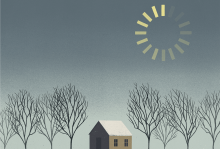
FOR OVER A month now, like everyone else, I have been isolated at home. Here with me are my wife, Polly, and our two youngest sons, both college students. All of us are continuing our work and studies online, and our rural home has become a sort of cyber-monastery. We meet in the morning for daily Mass on YouTube, then peel off to our separate hotspots to toil through the day. We don’t have compline, but we do often reconvene to watch The West Wing.
This isn’t the life any of us would have chosen, but it’s probably good for the soul to surrender some of our precious, almighty power of choice, and it helps that almost everyone is going through this with us. But there’s one aspect of our locked-down life that we can’t attribute to the vagaries of a random virus, and it isn’t shared with most of our fellow citizens. Instead, it’s one of the many rank inequalities the COVID-19 crisis has exposed in American life.
Unlike most of you, we don’t have access to high-speed broadband internet. Two months ago, that might have seemed like a trivial complaint, but not now. And we’re far from alone. The best estimate says that there are about 42 million of us, about 13 percent of the U.S. population, mostly in rural America. Then there are all the people who could have access to broadband, but don’t, mostly because they can’t afford it. All told, about 30 percent of us are out here in the digital cold.
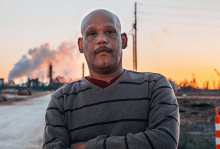
“Population: One”
When petrochemical plants overtook a historically black community in Louisiana, its residents were forced to leave one by one. But Stacey Ryan refused to go. Mossville: When Great Trees Fall is a documentary about Ryan’s commitment and resistance to environmental racism. Passion River Films.

THOSE ON THE margins live by a different economy. In the film Portrait of a Lady on Fire, the main characters live on the margins of a patriarchal society, and how they relate to one another shows creative care.
In the film, set in 18th-century France, a painter and her subject— a woman scheduled to marry a nobleman in Milan—fall in love. The painter Marianne is hired under the guise of being a walking companion to Héloïse, who, as a symbol of rejection of her forthcoming marriage, refused to sit for a previous portraitist.
After Marianne shows Héloïse a portrait of her she’s completed in secret, Héloïse criticizes it and agrees to sit for Marianne. During these few days of painting, Héloïse’s mother leaves, and the house and its economy rearranges.
Earlier in the film, the three women left in the house had strict roles and responsibilities. Héloïse went for walks, Marianne painted, and the maid Sophie served food. However, as love develops between Héloïse and Marianne, the household leaves behind the strict norms of aristocracy and assumes a much more egalitarian space. In a striking scene filled with role reversal, the lady Héloïse cooks, the artist Marianne pours wine, and the maid Sophie cross-stitches. On the margins of patriarchy, the strict delineations of class are thrown away, and the three share responsibility and care for one another.
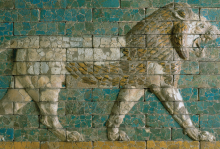
THIS ISN'T A lion: It’s a miracle. You can almost hear the imperious growls that would have thundered in the imaginations of pedestrians approaching ancient Babylon’s Ishtar Gate. They would have walked along the Processional Way to enter the inner city, flanked by cerulean blue tile walls with 120 nearly life-sized lion bas-reliefs—a spectacle!
Not so in 1899, when German archaeologists arrived on the banks of the Euphrates—80 miles from Baghdad—and dug until 1917. Babylon’s splendor had been reduced to mounds of thousands of glazed brick fragments, which would fill nearly 800 crates sent to Berlin. There, each piece was laboriously cleaned, stabilized with modern material, sorted and assembled into whole bricks, and ultimately restored into panels of proudly parading beasts in Berlin’s Pergamon Museum. Iraq has been trying to get them back since the 1990s.
For nearly two centuries the Greeks and the British have been arm wrestling over the Parthenon Marbles—including a lengthy frieze of a mythical Greek feast, a muscled river god, and voluptuous female figures—taken from the Acropolis in Athens and now displayed in London’s British Museum. Lord Elgin was Britain’s ambassador to the Ottoman Empire, which encompassed Greece. Greece claims that Lord Elgin stole them, that the sale was illegitimate since Greece was occupied, and that they should be returned.

One of the biggest gleanings from Mrs. America is that women and their motivations for power are complicated and far from monolithic.